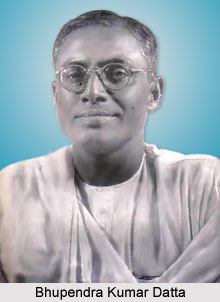 Bhupendra Kumar Datta was one of the prominent Indian Freedom fighters and an Indian revolutionary who significantly contributed to the Indian freedom struggle against the rule of the British Empire in India. He was the leader of the revolutionary organisation Jugantar in Bengal. Datta also held the record of a hunger strike that lasted for 78 days in Bilaspur Jail in the year 1917.
Bhupendra Kumar Datta was one of the prominent Indian Freedom fighters and an Indian revolutionary who significantly contributed to the Indian freedom struggle against the rule of the British Empire in India. He was the leader of the revolutionary organisation Jugantar in Bengal. Datta also held the record of a hunger strike that lasted for 78 days in Bilaspur Jail in the year 1917.
Early Life of Bhupendra Kumar Datta
Bhupendra Kumar Datta was born on 8 October 1892 8 October 1892 in Bengal (presently in Bangladesh), British India. Kailash Chandra Datta, his father, was the Manager of the Parchar estates in Faridpur; while Bimala Sundari, his mother, was a charitable woman. He had four siblings namely Suprabha, Snehalata, Jadugopal and Kamalini. During his childhood, Bhupendra Kumar was much inspired by the learning of the Bhagavad Gita, the teachings of Swami Vivekananda and the composition of Bankim Chandra Chatterjee. While he was studying in Faridpur Government High School, Datta became a part of the revolutionary group Anushilan Samiti. He was motivated by their anti-Partition agitations and humanitarian activities from the year 1905.
Bhupendra Kumar Datta was later admitted to the Scottish Church College of Calcutta (now Kolkata) in the year 1911. There he met with Sachin Sanyal and 2 other members of the early Anushilan Samiti of Calcutta. Bhupendra Kumar Datta went to Khulna and joined the Daulatpur Hindu Academy in 1913. There he was inspired by the liberal spirit in the campus and formed a group with his friends to conduct social work and raise funds for the deprived and poor. He successfully passed the Intermediate Examination in March 1915 and attained very high marks with distinctions for the excellence of his English and Bengali prose. Datta got admitted to the Sanskrit College of Kolkata and attended courses in philosophy at the Presidency College.
Bhupendra Kumar established a hostel which included intelligent students Jnan Ghosh, Jatin Seth, Jnan Mukherjee, Sailen Ghosh, Sisir Mitra and Meghnad Saha, who were all known to Bagha Jatin, also known as Jatindranath Mukherjee.
Revolutionary Activities of Bhupendra Kumar Datta
After the death of Bagha Jatin in September 1915, Bhupendra Kumar Datta stepped forward to continue the revolutionary movement. He was detained by the British Indian Police on 17 May 1917 and was eventually released in the year 1920. Datta wanted to accelerate the tempo of the non-cooperation movement and thus met with Mahatma Gandhi at the Nagpur session of the Indian National Congress Party. He later traveled to Puducherry to discuss with Sri Aurobindo Ghose regarding the future prospect of the Jugantar.
Datta was again arrested on 23 September 1923 and was deported to Mandalay in Burma. He was later joined by Subhash Chandra Bose, who offered him Memories of a Revolutionist by Kropotkin. Bhupendra Kumar was released in 1928 and resumed his diverse role of maintaining associations with several leaders the Jugantar group. He also kept contact with Bhagat Singh in Punjab, Surya Sen in Chittagong. Bhupendra Kumar Datta edited Swadhinata, the party organ and also looked after the manufacture and distributing of arms and ammunitions and bombs. He provided support and shelter to the members of the Indian Republic army who conducted the Chittagong Armoury Raid Case. In the year 1930, he was arrested again and was imprisoned for almost of 8 years. Bhupendra Kumar Datta was again arrested in the year 1941 and was imprisoned till 1946.
Literary Works of Bhupendra Kumar Datta
During 1938- 1941 and 1946-1951, he edited the weekly journal, Forward. The editorials formed by him were read by numerous freedom fighters and patriots. A compilation of his essays titled Indian Revolution and the Constructive Programme was featured with a foreword by Dr Rajendra Prasad, who eventually became the first President of independent India.
Bhupendra Kumar Datta died on 29 December 1979 in Calcutta, presently known as Kolkata, in the Indian state of West Bengal.



















